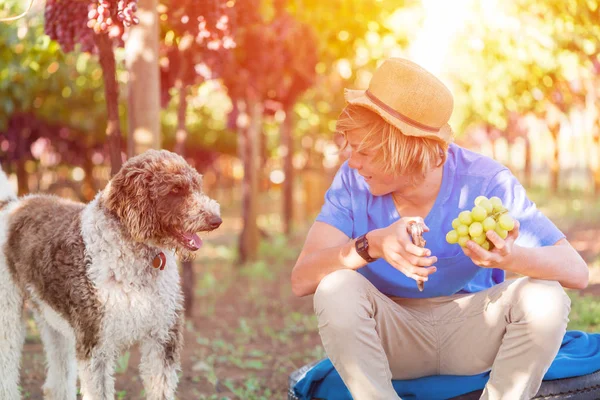While you may be tempted to share fruits and vegetables with your dog as a treat, the bottom line when it comes to grapes or raisins is that even one grape can be toxic to a dog. No matter what the breed, size, or age of the dog, grapes or raisins could cause acute kidney failure, proving fatal.
Little is known about why grapes and raisins are so toxic to dogs. It could be that they contain mycotoxins, which are produced naturally by mold and fungus, and salicylate, which is an aspirin-like substance that naturally occurs in grapes. Recent studies also suggest it may be the amount of tartaric acid found in some grapes that could be the culprit. Whatever the cause, ingesting grapes or raisins reduces blood flow to the kidneys, and prolonged exposure to whatever the toxin is results in acute, sudden kidney failure.
Symptoms of grape poisoning start 12-24 hours after ingestion and can include vomiting, loss of appetite, diarrhea, and lethargy. As the poisoning progresses, the signs of progressing to kidney failure include increased thirst and urination, breath that has the odor of ammonia to it, and obvious abdominal pain. Kidney failure is when the kidneys are no longer able to produce urine, which leads to a buildup of waste within the body because toxins are now building up in the bloodstream. Once the poisoning has reached this level, the prognosis becomes poor, as kidneys, in general, do not repair or regenerate themselves.
The key to saving your dog after they have ingested grapes or raisins is to seek immediate treatment. I suggest visiting the nearest emergency room if you are unable to see your regular vet immediately. Treatment will involve emptying out the stomach and, most times, administering charcoal to absorb the toxins. The few dogs I know that ate grapes and one a box of raisins were admitted to the hospital and placed on IV fluids for two to five days with constant monitoring of their kidneys. The raisin eater, as a result of this incident, has now been diagnosed with chronic kidney disease.
To avoid this situation, the bottom line is to never let your dogs have access to grapes or raisins. If you have small children who eat either as a snack and a dog that could potentially steal or be given these snacks, it is your job to make sure it never happens. The only way to avoid this serious and potentially fatal situation is to remove the possibility of your dog eating grapes or raisins.
If you have any questions, please feel free to email me at heidi@fouronthefloordogtraining.net.
Heidi Clayton started Four On the Floor Dog Training to provide positive, reward-based dog training in South Jersey. She breeds, trains and shows bull terriers under the SoraBully’s Bull Terriers kennel name. Email questions to heidi@fouronthefloordogtraining.net or learn more at https://fouronthefloordogtraining.net

















